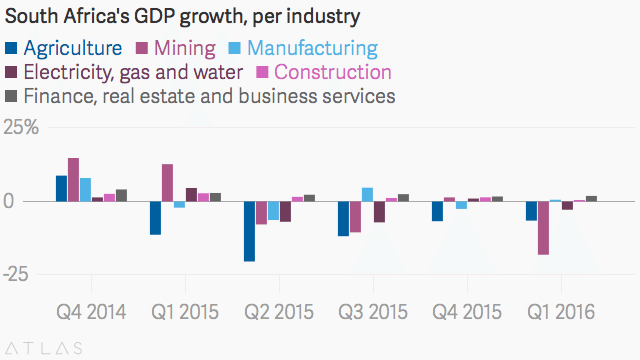-
Tips for becoming a good boxer - November 6, 2020
-
7 expert tips for making your hens night a memorable one - November 6, 2020
-
5 reasons to host your Christmas party on a cruise boat - November 6, 2020
-
What to do when you’re charged with a crime - November 6, 2020
-
Should you get one or multiple dogs? Here’s all you need to know - November 3, 2020
-
A Guide: How to Build Your Very Own Magic Mirror - February 14, 2019
-
Our Top Inspirational Baseball Stars - November 24, 2018
-
Five Tech Tools That Will Help You Turn Your Blog into a Business - November 24, 2018
-
How to Indulge on Vacation without Expanding Your Waist - November 9, 2018
-
5 Strategies for Businesses to Appeal to Today’s Increasingly Mobile-Crazed Customers - November 9, 2018
South Africa edges toward recession with drop in mining
South Africa edged closer to a recession Wednesday on news that the economy had shrunk by 1.2 per cent in the first three months of 2016 amid a fall in production at the country’s mines. Asked why the weaker rand didn’t boost mining output, Lehohla said the reality was that the global demand for the goods that South Africa was producing was flat.
Advertisement
Mining contributes almost eight percent to GDP but has been hit by weak commodity prices.
Economists polled by Reuters had expected a quarter-on-quarter GDP contraction of 0.1 percent while the economy was seen expanding 0.1 percent year-on-year. The transport industry entered a recession in the three months through March and declined by an annualized 2.7 percent.
The central bank forecasts growth at 0.6 percent this year, which inhibits its scope to raise interests to tame rising inflation stoked by a weaker rand and rising food prices.
“Where we stand now, the numbers do not match the 6 percent annual growth” targeted in the government’s plan, Statistician General Pali Lehohla told reporters in Pretoria. S&P Global Ratings affirmed the nation’s credit rating at BBB-, the lowest investment-grade level, with a negative outlook, on June 3 and warned it could cut South Africa’s debt to junk if the economy doesn’t improve or if institutions are weakened by political interference.
As the country suffers a major decline in investor confidence, a sub-investment grade rating would likely prompt selling by funds that do not hold junk-rated securities.
Critics blame President Jacob Zuma for the economic malaise, demanding that he resign for changing finance minister twice in one week in December, triggering market turmoil.
For the first time, Statistics South Africa released combined production and expenditure estimates for gross domestic product (GDP), having assumed responsibility for the expenditure estimates from the South African Reserve Bank (SARB).
South Africa, which expanded by an average 5.0 percent between 2004 and 2007, has been hit by weak worldwide commodity prices and the economic slowdown in China.
Growth was also hit by a protracted drought, with agriculture, which makes up 2.2 per cent of GDP, shrinking for the fifth consecutive quarter.
Advertisement
State prosecutors are appealing against an April court ruling that President Zuma should face nearly 800 corruption charges dating back to before he became president in 2009.





























